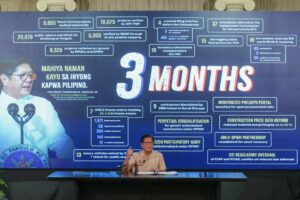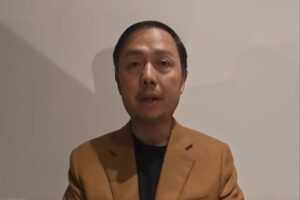By Erika Mae P. Sinaking
THE Independent Commission for Infrastructure (ICI) is working to determine how government agencies allegedly colluded, its officials said as it deepened probe of anomalous flood control projects, even as political blowbacks and economic ripples converge around the 10-week-old investigation.
“We have made it our mission to exact justice on those who stole from the people through anomalous infrastructure projects,” ICI executive director Brian Keith F. Hosaka told BusinessWorld in a Viber chat.
He said that the ICI remains “steadfast and determined” to fulfill its mandate for the benefit of Filipino taxpayers whose money must be protected.
The commission’s far-reaching probe has zeroed in on 80 of the most anomalous projects identified, implicating 37 individuals, including lawmakers, former Department of Public Works and Highways (DPWH) officials, and contractors who may face non-bailable charges.
To further the investigation, the ICI has also sought information and cooperation from more than 20 government agencies, utilizing mandates that could curb irregularities.
Commissioner Rogelio “Babes” L. Singson said that the ICI has been trying to trace how fraudulent networks operate within and across government agencies.
“In spite of the limited resources, I think we have been able to identify exactly how this whole anomalous connivance among agencies happens,” Mr. Singson told BusinessWorld in an interview last Nov. 6. “For you to be able to solve the problem, you should know, first of all, what the problem is — what caused it. So, at least, that has been identified.”
High-level accountability, Mr. Singson added, is non-negotiable, with the ICI prioritizing the “big fish” or the key actors who allegedly orchestrated and benefited from the scam.
Yet as the ICI tightens its investigative net, it now faces political counterattacks that complicate the atmosphere surrounding its probe.
Last week, former Party-list Rep. and Committee on Appropriations chairman Elizaldy S. Co — long expected to address flood control controversy and facing an impending Interpol Red Notice — surfaced to accuse President Ferdinand R. Marcos, Jr., along with top officials, of ordering a P100-billion insertion into the 2025 budget.
While the ICI said it is “carefully reviewing and studying” Mr. Co’s claims, the Palace swiftly dismissed the allegations as a desperate act from a man attempting to “save himself.”
Public Works Secretary Vivencio B. Dizon earlier projected that up to 40 individuals linked to fraudulent projects could be detained before Christmas, a potentially precedent-setting wave of arrests that may include Mr. Co, who is currently abroad.
Amid this back-and-forth, the Supreme Court has designated 26 regional trial courts to fast-track anti-graft cases linked to infrastructure corruption, with all regions expected to receive special courts.
Separately, economist Alfred Benjamin R. Garcia of AP Securities said that the country may be experiencing a short-term “overcorrection” in infrastructure sector, reflected in the slowdown of government spending on public works amid major anti-corruption reforms that have introduced strict fiscal safeguards.
“We run the risk of overcorrection in the infrastructure space, as seen in the sharp slowdown in government disbursements,” Mr. Garcia told BusinessWorld in a Viber chat. He cautioned that overly stringent measures could stall the implementation of legitimate projects and create bottlenecks that burden the broader economy.
“If the ICI investigation is conducted in the manner that it should be, and the commission comes up with a viable framework for infrastructure projects moving forward, that should help gradually restore investor confidence,” Mr. Garcia added.
According to Jean S. Encinas-Franco, political science professor at the University of the Philippines-Diliman, the ICI’s early achievements must be viewed through the lens of both its infancy and the surrounding political climate.
“Because with all the anger of the people, then at the very least… it’s good that there’s an ICI so that the public is assured that something is happening moving forward,” she said in a telephone interview.
Ms. Franco said that the commission’s success will ultimately be judged by results, particularly whether any major figures can actually be held accountable, and credibility will hinge on when “someone has actually been jailed.”
She suggested the commission could issue a report summarizing its actions and outcomes, “explaining to the entire country what happened and what they did.”
Last week, ICI officials participated in hearings in both chambers of Congress, fully backing up the proposed measures to transform the ICI into a permanent, legislated body to investigate flood control and infrastructure anomalies.






